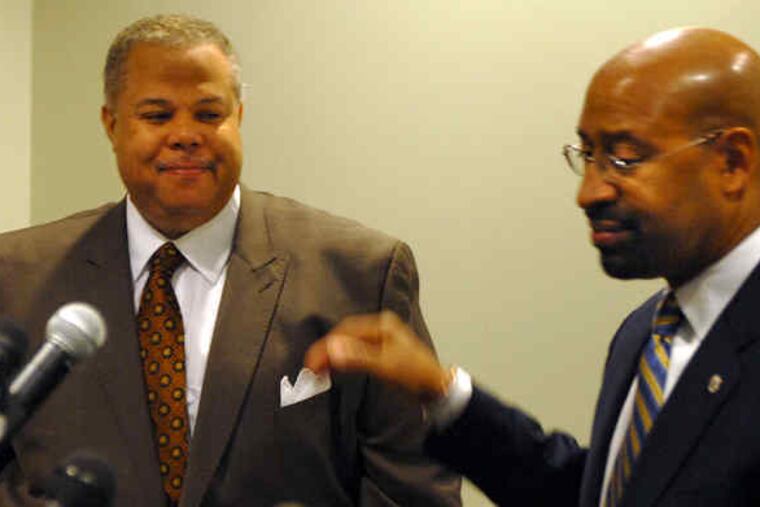Nutter endorses Williams in governor's race
Yes, he got into the race late. Very late. True, he's little known beyond his home turf. For now, anyway.

Yes, he got into the race late. Very late.
True, he's little known beyond his home turf. For now, anyway.
And, for the moment, you'll have to take his word that he's quickly raised close to $1.5 million.
But with no other candidate appearing to take clear command in the Democratic primary for governor, State Sen. Anthony Hardy Williams says he has as much chance as any of them to win the May 18 vote, now 53 days away.
"There are certainly people saying, 'What's he up to? Is it a maneuver?' " Williams said recently, conceding that his biggest task has been to convince a skeptical political class in Pennsylvania that he's both serious about running and has a credible shot.
Yesterday, he gained on both counts.
Mayor Nutter, standing with Williams at a battery of microphones in the Science Center in West Philadelphia, formally gave his endorsement to Williams' candidacy.
Calling Williams "a great public servant" and "a very good friend of mine," Nutter said Williams was the best candidate to improve schools, enhance public safety, and promote economic development.
Williams, 53, and Nutter, 52, share a base of political support. Both are Democratic ward leaders in West Philadelphia. Both came of age in the 1970s, when Williams' father, the late Hardy Williams, was the city's first credible black candidate for mayor.
With them at the mike was State Rep. Dwight Evans, who in 1994 was the city's first viable African American candidate for governor.
That year, in a six-way Democratic primary, Evans came in second with 21 percent of the votes. This year, in a four-candidate field, the winner might need 30 percent to 35 percent of the vote, he said.
In a Franklin and Marshall College poll released this week, 71 percent of Democratic voters who responded said they had not yet made up their minds whom to vote for.
Williams said yesterday that his challenge would be to "ignite" his base, starting with Philadelphia, home to 19 percent of the state's 4.3 million registered Democrats.
U.S. Rep. Robert A. Brady, the city's Democratic Party chairman, said in an interview that Philadelphia would deliver for Williams. "I think he's going to come out of Philadelphia extremely high," Brady said. "He's got an excellent chance."
Williams' Eighth Senate District includes parts of West, South, and Southwest Philadelphia, along with old trolley suburbs in Delaware County.
In an interview last Friday, Williams said that ideally he would have started laying the groundwork for a campaign more than a year ago. He had been thinking of backing Democrat Tom Knox, who dropped out in January.
On Feb. 5, when he announced his campaign at a Democratic State Committee gathering in Lancaster, Williams said he had deposited $500,000 into his war chest.
He now says he expects to raise $3.5 million to $4 million for the primary - enough to make himself known across the state in TV ads, and enough to compete with Allegheny County Executive Dan Onorato, the money leader in the race so far.
The source of Williams' money has become a matter of intrigue in Democratic circles. He wasn't in the race the last time candidates had to file public reports on their finances. The next report is due April 6.
Williams has declined to identify his contributors. But he did not dispute reports that much of his support has come from high-level financial traders who like his stance on "school choice."
Williams said he understood "school choice" as an umbrella term covering charter schools, tax write-offs to corporations for donating tuition money to private schools, and government-paid vouchers for private education.
His allies have said one of Williams' donors is Joel Greenberg, managing director of Susquehanna International Group of Bala Cynwyd, which describes itself as "an innovator in global finance."
Greenberg did not take calls from an Inquirer reporter. He was quoted recently in the Jewish Exponent saying he considered access to a top-notch education a basic civil right.
Williams is a founder of the Hardy Williams Charter School in Southwest Philadelphia. The school president, Dawn Chavous, is his campaign manager.
The other Democrats in the race - Onorato, state Auditor General Jack Wagner, and Montgomery County Commissioner Joe Hoeffel - said this week that they, too, supported charter schools and tax write-offs.
A decade ago, Williams was a leader in getting both measures passed in the legislature.
Onorato and Hoeffel parted company with Williams on vouchers - a means of funding private education that many Democrats, including Nutter, oppose. Wagner said he was open-minded to vouchers but would have to see a specific proposal.
A half-hour before Nutter's endorsement announcement yesterday, Hoeffel put out a news release noting Nutter's efforts at "improving public education" and calling it an "irony" that the mayor was backing Williams. Hoeffel has said he believes that by diverting money from public schools, vouchers would "destroy" city schools.
Evans said Hoeffel's comments constituted "an attack" on both Williams and Nutter.
But Nutter, who promised not to bash any of the Democratic candidates, was restrained.
He said that although he disagreed with Williams about vouchers, he considered him a champion of public schools who has fought for greater state funding of education.
"On a personal level, the senator and I have differences on that particular issue," he said. "I am not going to allow that to become some kind of wedge between us. That is one of a million issues."